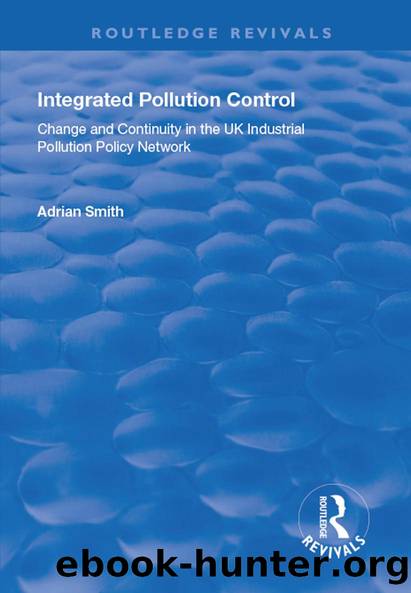Integrated Pollution Control by Adrian Smith

Author:Adrian Smith [Smith, Adrian]
Language: eng
Format: epub
Tags: Social Science, General, Sociology
ISBN: 9780429843860
Google: MPmADwAAQBAJ
Publisher: Routledge
Published: 2018-12-21T03:45:08+00:00
Summary and conclusions
This chapter has sought to demonstrate that the forces driving IPC policy formulation lay outside the industrial air pollution policy community. Contrary to the initial hypothesis, it would seem that the issue network which arose in the policy sector during the 1980s was not responsible for the changes. Indeed, the issue network appears to have sought conservative management of externally driven change.
An issue network did not arise having a variety of members with diverse views, in which a wide-ranging debate concerning industrial pollution policy could take place. The changes were not the outcome of such wide participation or issue network debate. Environmental NGOs, for example, were not members of the issue network and have played a very minor, contextual role in the IPC policy process, even though they represent a legitimate concern about industrial pollution.
Instead, the industrial air pollution policy community opened up into an issue network defending some of the communityâs regulatory practices. EC pollution legislation prompted DoE involvement in the industrial air pollution policy sector. They began preparing reforms of policy which included EC requirements whilst maintaining elements of the British tradition. Further EC legislation in the form of uniform pollution standards was a possibility concerning both industry and the Inspectorate.
Core policy community members joined the DoE in an issue network. The consensus amongst this issue network membership was that the British tradition of site specific flexibility on pollution standards needed preserving, based upon scientific proof of pollutantsâ harm. They believed a redistribution of resources was required in the sense that the Inspectorateâs technical expertise needed returning to the DoE so that it could more effectively restore credibility and defend British policy, particularly in Brussels. In this respect, the issue network maintained a shared appreciative system.
However, the HSE was becoming more interested in industrial air pollution control (ENDS, 1985b). Inspectorate absorption into the HSE structure threatened the formerâs autonomy. Such HSE issue network membership was unwelcome, and other members sought to deny it influence over the Inspectorate and industrial pollution policy. However, to secure a transfer of the Inspectorate from the HSE (under Department of Employment authority) to the DoE needed the agreement of government, who possessed the authority to make such arrangements between Departments.
Appeal to government resulted in it taking the opportunity to launch an Efficiency Scrutiny into this policy sector. It was the deregulatory recommendations of this Scrutiny which convinced government that HMIP should be created in the DoE, and which launched an integrated approach to industrial pollution control. DoE proposals for a Clean Air Bill at that time had been turned down by government.
So policy change arose outside of the industrial air pollution policy network. EC pressure meant regulation of processes would become more transparent and follow more formal procedures. It required policy reforms. HSE interest in the policy sector threatened DoE control over those reforms. The DoE, supported by other issue network members, had to appeal to yet another external policy actor (government) in order to secure control over policy. In both cases the issue network was reacting to external intervention.
Download
This site does not store any files on its server. We only index and link to content provided by other sites. Please contact the content providers to delete copyright contents if any and email us, we'll remove relevant links or contents immediately.
Collaborating with Parents for Early School Success : The Achieving-Behaving-Caring Program by Stephanie H. McConaughy; Pam Kay; Julie A. Welkowitz; Kim Hewitt; Martha D. Fitzgerald(896)
Entrepreneurship Education and Training: The Issue of Effectiveness by Colette Henry Frances Hill Claire Leitch(664)
Adding Value to Policy Analysis and Advice by Claudia Scott; Karen Baehler(499)
Materializing the Middle Passage by Jane Webster;(496)
Race and American Political Development by unknow(485)
Sociological Perspectives of Health and Illness by Constantinos N. Phellas(476)
American Government and Politics Today by Steffen W. Schmidt Mack C. Shelley Barbara A. Bardes(475)
Human and Global Security : An Exploration of Terms by Peter Stoett(459)
Control Of Oil - Hardback by Kayal(456)
The Disappearance of Rituals: A Topology of the Present by Byung-Chul Han(398)
Advances in Child Development and Behavior, Volume 37 by Patricia J. Bauer(395)
The Catholic Church and European State Formation, AD 1000-1500 by Jørgen Møller(388)
The World According to China by Elizabeth C. Economy(378)
Theories of Counseling and Psychotherapy: A Case Approach by Nancy L. Murdock(370)
Left Is Not Woke by Susan Neiman(366)
Application of classical statistics, logratio transformation and multifractal approaches to delineate geochemical anomalies in the Zarshuran gold district, NW Iran by unknow(362)
Turkey's Relations with the West and the Turkic Republics: The Rise and Fall of the Turkish Model by Idris Bal(352)
Cross-Cultural Child Development for Social Workers by Lena Robinson(347)
Japan's Ainu Minority in Tokyo by Mark K. Watson(330)
